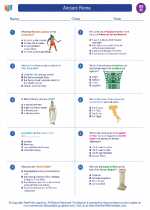Microorganisms
Microorganisms, also known as microbes, are tiny living organisms that are too small to be seen with the naked eye. They include bacteria, viruses, fungi, and protozoa. Microorganisms are found everywhere - in the air, water, soil, and even inside other living organisms.
Types of Microorganisms
- Bacteria: Single-celled organisms that can be found in various environments. Some bacteria are beneficial and essential for processes like digestion, while others can cause diseases.
- Viruses: Infectious agents that require a host cell to replicate. They can cause a range of diseases in humans, animals, and plants.
- Fungi: Include diverse organisms such as yeasts, molds, and mushrooms. They play important roles in decomposition and nutrient cycling, but some fungi can also cause infections.
- Protozoa: Single-celled organisms that can be found in water and soil. Some protozoa are parasitic and can cause diseases like malaria and dysentery.
Importance of Microorganisms
Microorganisms play crucial roles in various ecological processes, such as nutrient cycling and decomposition. They are also used in various industries, including food production, medicine, and biotechnology. Additionally, some microorganisms can cause diseases in humans, animals, and plants, making them important subjects of study in the field of medicine and public health.
Studying Microorganisms
To study microorganisms, scientists use a variety of tools and techniques, such as microscopes, culturing methods, and molecular biology techniques. Understanding microorganisms is important for fields such as microbiology, immunology, and epidemiology.
Study Guide
Here are some key points to remember when studying microorganisms:
- What are the main types of microorganisms?
- Describe the importance of microorganisms in ecological processes and industries.
- Explain the role of microorganisms in causing diseases.
- What tools and techniques are used to study microorganisms?
By understanding the characteristics and roles of microorganisms, we can gain insights into their impact on the environment, human health, and various industrial processes.
[Microorganisms] Related Worksheets and Study Guides:
.◂Social Studies Worksheets and Study Guides Eighth Grade. Ancient Rome

 Worksheet/Answer key
Worksheet/Answer key
 Worksheet/Answer key
Worksheet/Answer key
 Worksheet/Answer key
Worksheet/Answer key
